
Bahru Zewde, Ph.D.
Professor (emer.) of History
Addis Ababa University
Born in 1947 in Addis Ababa
Studied History at Haile Selassie I University (now Addis Ababa University) and African History at the University of London
Project
A History of the Ethiopian Student Movement, 1960-1974
The Ethiopian Student Movement, which went through successive stages of self-awareness, reformism, and revolutionary commitment, forms an essential backdrop to the 1974 Ethiopian Revolution. To it can be traced the overthrow of one of the oldest monarchies in the world, the ultimately disastrous policy of socialist construction, and the current experiment in ethnic federalism. And yet, most assessments of the post-1974 situation in Ethiopia do not seem to be informed by an understanding of this backdrop. The project aims to fill this gap by writing a definitive history of that movement.I have already done extensive research on the subject, consulting both the secondary literature and the contemporary publications of student unions inside and outside the country. More recently, I organized an innovative four-day collective exercise in recollection by some two dozen former student leaders and activists. Those reflections, now transcribed and edited, constitute an important and massive corpus of primary data addressing such vital areas of research interest as: the rather innocuous beginnings of student activism, the radicalization of the student movement in the early 1960s, the genesis and course of the "national question", which forms such an important political ingredient of contemporary Ethiopia, and the evolution of the student groupings into leftist political organizations.
The one-year residency at the Wissenschaftskolleg, with its atmosphere of serenity and fruitful scholarly interaction, should provide me with the perfect opportunity to write up this massive material into a publishable manuscript.
Recommended Reading
Zewde, Bahru. Society, State and History: Selected Essays. Addis Ababa: Addis Ababa University Press, 2008.
-. Pioneers of Change in Ethiopia: The Reformist Intellectuals of the Early Twentieth Century. Oxford: James Currey, 2002.
-. A History of Modern Ethiopia 1855-1991. Oxford: James Currey, 2001.
Colloquium, 08.02.2011
Marxist-Leninist Rhetoric and Political Reality: The Ethiopian Student Movement and the "National Question"
As we read current news reports of students demonstrating in the streets of Paris and London, we are transported to the heady days of the late 1960s, when students rose in revolt against society in Beijing, Berkeley, Berlin, Mexico City, and Paris, to mention only the more celebrated cases. The Ethiopian Student Movement was part of that global student revolt of the 1960s. At the same time, however, it had a history and character of its own. In the absence of any formal political opposition to the imperial regime, it assumed the mantle of His Imperial Majesty's Disloyal Opposition and called for nothing less than the reordering of society. That opposition culminated in the 1974 revolution, which spelt the end not only of a reign of 44 years but also of a dynasty claiming three millennia of continued existence.
The students raised two fundamental issues that challenged the imperial regime. The first was the issue of land reform. The nearly decade-long campaign started in 1965 when students came out onto the streets of Addis Ababa with the slogan of "Land to the Tiller", thereby calling an end to the prevalence of tenancy, particularly in the southern half of the country. It was resolved with the 1975 rural land proclamation, arguably one of the most radical land redistribution measures undertaken anywhere in the world. The second was the "national question", designed to address the problem of domination of the peripheral nationalities by the historic core. It centered above all on what position the student movement should take regarding the armed struggle that had started in Eritrea in 1961.
My presentation, which summarizes a prospective chapter of my book project at WIKO, examines the trajectory of the debate on the "national question", from its first articulation in 1969 - successively at the 17th Congress of Ethiopian Students Union in North America (ESUNA) in Philadelphia and with the paper read by one of the most militant students at the main campus of Haile Sellassie I University - to its final resolution in 1971 - at the 11th Congress of Ethiopian Students Union in Europe (Berlin) and the 19th Congress of ESUNA (Los Angeles). The stand that was taken in 1971 - to recognize the right of nations to self-determination up to and including secession - was not only adopted by all the leftist parties that emerged from the student movement but has now come to be enshrined in the 1994 Constitution of the Federal Democratic Republic of Ethiopia.
Publications from the Fellow Library
Zewde, Bahru (Oxford, 2014)
The quest for socialist utopia : the Ethiopian student movement, c. 1960 - 1974 Eastern Africa series
Zewde, Bahru (Addis Ababa, 2010)
Documenting the Ethiopian studend movement : an exercise in oral history
Zewde, Bahru (Addis Ababa, Ethiopia, 2008)
Society, state and history : selected essays
Zewde, Bahru (Oxford, 2007)
A history of modern Ethiopia : 1855 - 1991 Eastern African studies
Zewde, Bahru (2006)
Die italienische Besatzung in der Geschichte und Erinnerung Äthiopiens
Zewde, Bahru (2004)
What did we dream? : what did we achieve? And where are we heading?
Zewde, Bahru (2002)
The city center : a shifting concept in the history of Addis Ababa
Zewde, Bahru (2002)
The city center : a shifting concept in the history of Addis Ababa
Zewde, Bahru (Oxford [u.a.], 2002)
Pioneers of change in Ethiopia : the reformist intellectuals of the early twentieth century Eastern African studies
